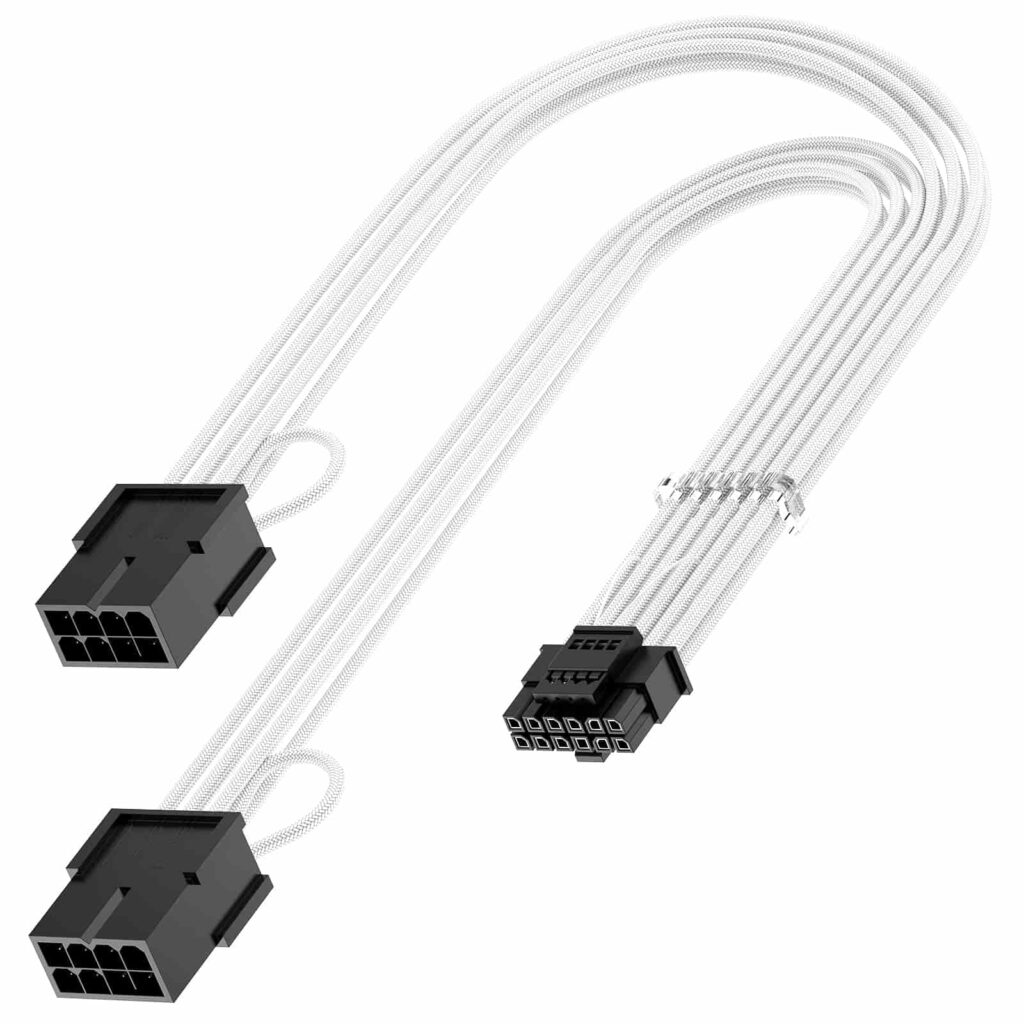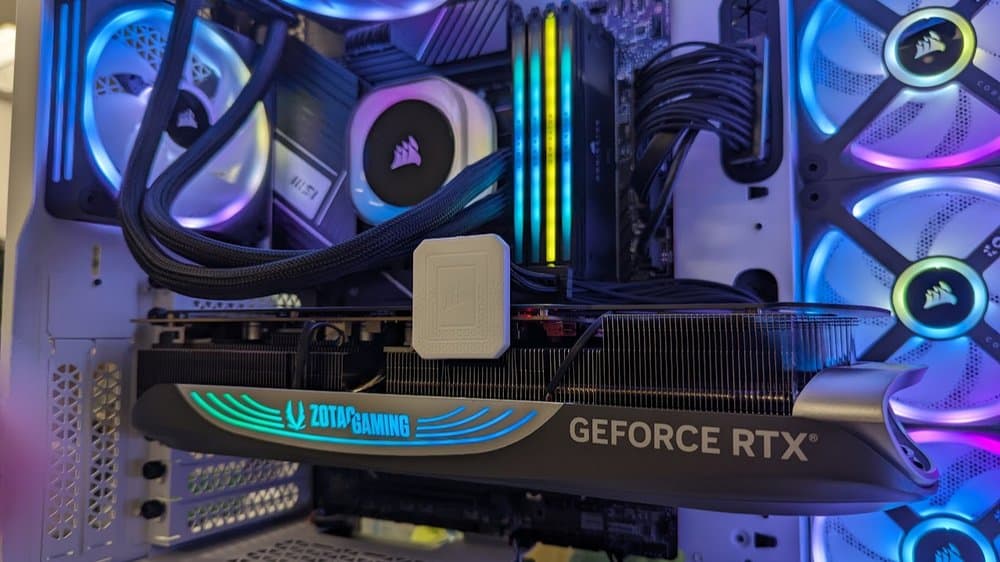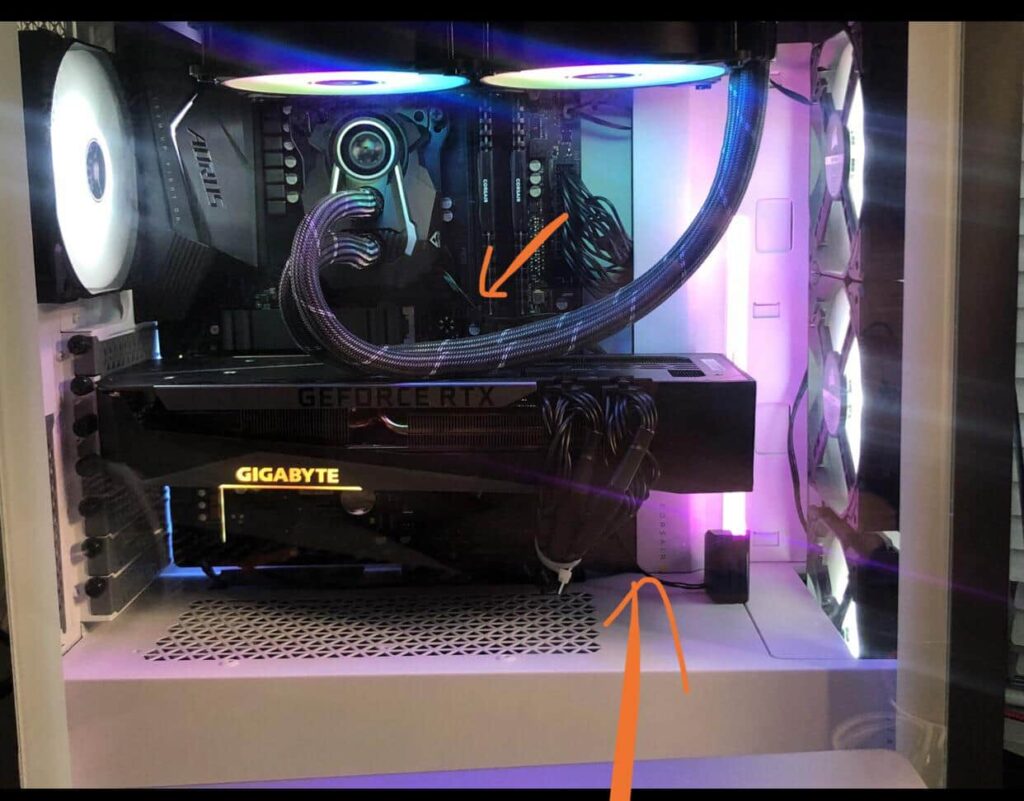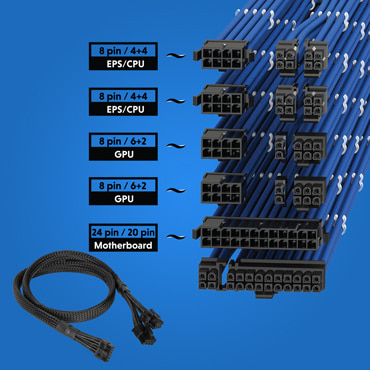I once tried using a CPU cable for my GPU, thinking it would work just fine. Unfortunately, it led to system instability and performance issues. After learning the hard way, I now always use the correct cables for each component.
No, you should not use a CPU cable for your GPU. CPU cables and GPU cables are different and using the wrong one can cause damage or poor performance. Always use the correct GPU cable to ensure your system works properly.
Stay tuned with us as we dive into the topic of “Can you use a CPU cable for GPU?“
What Is A CPU Cable?
A CPU cable provides power to your computer’s processor. It typically has 4, 6, or 8 pins, designed to fit into the CPU power connector on the motherboard. This cable supplies the processor with the necessary power to function correctly, ensuring stable performance and smooth operation of your computer.
What Is A GPU Cable?
A GPU cable supplies power to your graphics card. It usually has 6 or 8 pins, and sometimes both, depending on the GPU’s power needs. This cable connects the graphics card to the power supply to ensure it gets enough power for rendering images and handling graphics tasks efficiently.

Can You Use A CPU Cable For A GPU?
No, you cannot use a CPU cable for a GPU. CPU cables and GPU cables have different pin configurations and power requirements. Using a CPU cable for a GPU might cause power issues or even damage your hardware. Always use the correct cable specified for your GPU to ensure proper operation.
Read: CPU On Ubuntu Running High – GPU – A Complete Guide Of 2024!
What Are The Differences Between CPU And GPU Cables?
CPU cables and GPU cables differ in their pin configurations and power ratings. CPU cables typically have 4, 6, or 8 pins and are used for the processor, while GPU cables have 6 or 8 pins for the graphics card. The differences ensure that each component receives the correct amount of power needed for optimal performance.
Why Might A CPU Cable Not Work For A GPU?
A CPU cable might not work for a GPU because it is designed for different power requirements and connectors. GPUs often need more power and different pin configurations compared to CPUs. Using a CPU cable might result in insufficient power delivery or connection issues, affecting the performance of your graphics card.
What Are The Risks Of Using The Wrong Cable For Your GPU?
Using the wrong cable for your GPU can lead to several problems, including system instability, poor performance, or even hardware damage. If the cable does not provide the correct power or fit, it can cause your GPU to malfunction or not work at all, potentially harming your entire computer system.
What Is The Importance Of Using The Correct Cable For Your GPU?
Using the correct cable for your GPU is crucial because it ensures that your graphics card receives the right amount of power. This prevents performance issues and avoids potential damage to your hardware. Proper cables help your GPU run smoothly and efficiently, providing a stable and reliable computing experience.
Are There Alternatives To Using A CPU Cable For A GPU?
Use a Dedicated GPU Cable:
Most power supplies come with cables designed specifically for GPUs. These are the best choices for powering your graphics card.
Adapter Cables:
You can use adapters that convert CPU power cables to GPU power connectors, but these should be used with caution.
Check Power Supply:
Some power supplies have multiple PCIe connectors for GPUs; use these instead of CPU cables.
Upgrade Power Supply:
Consider upgrading to a power supply with native GPU cables if your current one lacks them.
How Can You Check If Your Cable Is Compatible With Your GPU?

Check the Pin Count:
Make sure the cable has the same number of pins as the GPU connector. This helps ensure it fits correctly.
Match the Connector Shape:
The cable’s connector should fit smoothly into the GPU without forcing it. A proper fit is essential for a secure connection.
Review the Power Rating:
Ensure the cable supports the power your GPU needs. Check the GPU’s manual for the recommended power rating.
Consult the Manuals:
Always refer to the GPU and power supply manuals for specific cable compatibility guidelines. This helps avoid mistakes.
What Are Some Tips For Safe Cable Usage To Avoid Damage?
Use the Correct Cables:
Always use cables designed for your specific hardware to avoid power issues.
Avoid Overloading:
Do not exceed the power rating of the cables to prevent overheating and damage.
Check for Damage:
Regularly inspect cables for fraying or damage, and replace them if necessary.
Ensure Proper Connection:
Make sure cables are connected firmly and securely to avoid loose connections or short circuits.
Read: CPU Usage Drops When I Open Task Manager – Optimize Your Performance!
Can A CPU Cable Power A GPU?
No, a CPU cable cannot power a GPU properly. They have different connectors and power requirements. Using a CPU cable for a GPU can cause issues and may not provide the correct power needed for the graphics card to function.
What Happens If I Use A CPU Cable For A GPU?
Using a CPU cable for a GPU can cause power problems or damage the GPU. The GPU might not get enough power, leading to poor performance or system instability. Always use the correct cable for your GPU.
Do CPU And GPU Cables Have Different Power Ratings?
Yes, CPU and GPU cables have different power ratings. GPU cables often need to supply more power and have different connectors compared to CPU cables. Using the correct cable is essential to match the power requirements of each component.
Can I Use A CPU Cable If My GPU Doesn’t Come With One?
No, you should not use a CPU cable for a GPU. If your GPU does not come with a cable, use a proper GPU power cable or get an adapter that is designed for your GPU’s power needs.

How Do I Know If A CPU Cable Is Compatible With My GPU?
Check if the CPU cable has the same number of pins and connector shape as required by your GPU. Verify the power rating of the cable matches what your GPU needs, usually found in the GPU’s manual.
Read: CPU With Integrated Graphics – Explore Integrated Graphics 2024!
Are There Specific Adapters To Use A CPU Cable For A GPU?
Yes, some adapters can convert CPU cables to GPU connectors. However, using them might not always be reliable or safe. It’s best to use cables specifically designed for your GPU.
What Should I Check Before Using A CPU Cable With My GPU?
Check the pin configuration and connector shape to ensure they match your GPU. Also, verify that the cable provides the correct power rating for your GPU to avoid potential damage or performance issues.
Will Use A CPU Cable Damage My GPU?
Yes, using a CPU cable can potentially damage your GPU. It might not supply the right power, which can lead to overheating or hardware failure. Always use the correct cable for your GPU.
Can I Use A CPU Cable For A GPU If I Don’t Have A GPU Cable?
No, it is not safe to use a CPU cable for a GPU. If you don’t have a GPU cable, get a proper one or use an appropriate adapter. Using the wrong cable can cause problems.
How Do I Safely Connect A CPU Cable To A GPU?
To safely connect a CPU cable to a GPU, ensure that the cable matches the GPU’s connector and power requirements. However, it is better to use the correct GPU cable to prevent potential damage or performance issues.

Read: Do I Need CPU Drivers – Essential Tips for Your PC!
Frequently Ask Questions:
1. How Do CPU And GPU Cables Differ In Appearance?
CPU cables usually have 4, 6, or 8 pins, while GPU cables often have 6 or 8 pins with different shapes.
2. Can Use A CPU Cable For A GPU Cause System Instability?
Yes, using a CPU cable for a GPU can cause system instability due to incorrect power supply and connector mismatches.
3. What Are The Signs That A CPU Cable Is Not Suitable For A GPU?
Signs include poor GPU performance, power issues, and connectors that do not fit properly or seem loose.
4. Is It Safe To Mix Different Types Of Power Cables For GPU And CPU?
No, mixing cables can cause power issues and damage. Use the correct cables for each component to ensure safe operation.
5. Can A Damaged CPU Cable Be Used For A GPU?
No, a damaged CPU cable should not be used for any component. It can cause power problems and potential damage.
6. What Power Connectors Do Most GPUs Require?
Most GPUs require 6 or 8-pin PCIe connectors for power. Check your GPU’s manual for the exact requirements.
7. How Important Is It To Match The Wattage Of The Cable With The GPU?
Matching the wattage is crucial to ensure the GPU receives adequate power and functions correctly without causing damage.
8. Are There Any Benefits To Using A CPU Cable With A GPU?
There are no benefits. CPU cables are not designed for GPUs and can lead to performance issues or damage.
9. What Types Of Power Cables Are Recommended For High-Performance GPUs?
High-performance GPUs usually need 8-pin or 12-pin PCIe cables. Ensure cables match the GPU’s power requirements and specifications.
10. Can Using A CPU Cable Instead Of A GPU Cable Affect Your Computer’s Performance?
Yes, using the wrong cable can reduce performance and cause instability. Always use the correct cable to ensure proper functioning.
Conclusion:
In Conclusion, using a CPU cable for your GPU is not recommended. Each cable is designed for specific power needs and connections. Using the wrong cable can lead to system instability, poor performance, or even hardware damage. Always ensure you’re using the correct GPU cable to keep your computer running smoothly and safely. It’s crucial to match the right cable with the right component for optimal performance.
Related Posts:
- Is My CPU Compatible With Windows 11 – A Comprehensive Guide 2024!
- B550 Gaming Plus CPU Light On – Fix B550 CPU Light Now!
- Windows 11 AMD CPU Compatibility List – Upgrade For Windows 11 Now!
- CPU Machine Check Architecture Error Dump – Fix Hardware Issues!
